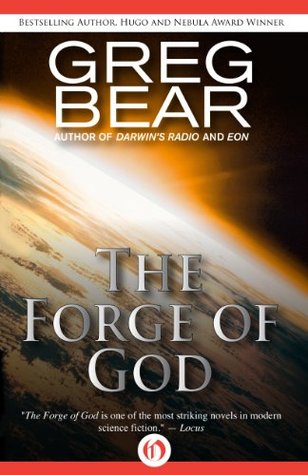In the span of a couple of months, Europa disappears and two alien spacecraft are simultaneously found on Earth. In Australia, the AI occupants bring enlightenment and the promise of a better future for humanity. In Death Valley, Nevada, a dying alien humanoid says that he hitchhiked on the spacecraft after his world was destroyed, and that the “planet-eaters” have come to destroy Earth. There’s nothing anyone can do to stop them.
The Forge of God has an engaging premise about the end of the world by multiple highly advanced alien races, and it thoroughly explores helplessness in the face of overwhelming odds and the uncertainty of not knowing if, when, and how the end might come. The structure also moves the story along quickly with its short chapters and frequently changing points of view.
Unfortunately, the execution does not work very well for me. In an effort to provide different perspectives on the situation, there are a plethora of main male American characters, and I am not able to connect with any of them due to a lack of deeper characterization. Instead, I persisted on pure scifi interest. This novel seems to be an exercise in recognizing the inadequacy of the human race (which I very much like in theory), but it translates on the page into a story in which none of the protagonists ever does anything. It’s so difficult to be a part of a race, who, in the face of their ultimate demise (maybe), does not ally nations, blow up spaceships, or seek an any way to perform experiments to understand and perhaps save themselves.
I think Bear wants the reader the accept how small we are in the vastness of possibilities, which he does very well here. Persevere through this one and you’ll feel the inadequacy of your birth in a galaxy that’s only one of millions of billions in this amazing and expanding universe. Recommended for hard scifi fans who like big ideas but don’t necessarily need a main character to carry you through the story.
“The Forge of God cannot be appeased, but perhaps there is hope for each of us, in our private thoughts, to make peace with God, and find a way out from under the blows of His anger and disappointment.”
